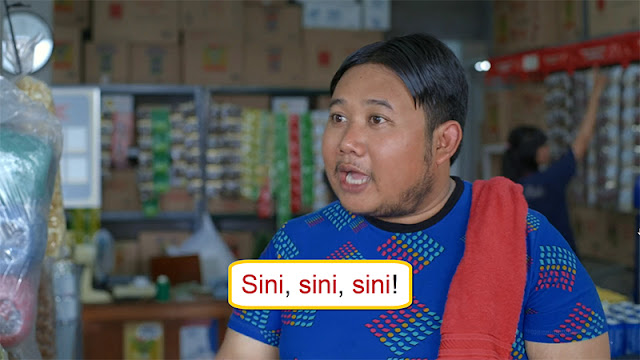- Get link
- X
- Other Apps
Posted by
Iman Prabawa
on
- Get link
- X
- Other Apps
Halo semuanya, ketemu lagi ama aye, Iman Prabawa. In this article, we are going to be talking about the meaning of the word [sini] in Indonesian. As always, we will also look at examples from movies, comics, and others where the word [sini] is used by Indonesians.
If you have any questions regarding the Indonesian language, you can ask me directly. You can see how to do that on my About Me page.
If you are a beginner in the Indonesian language, you can learn step by step with My Lesson Here.
So, without further ado. Let's dive in!
Sini In Indonesian
The first meaning of [sini] is to point to the place where someone is at the moment of speaking.
Example sentences:
1. Di sini lebih enak daripada di sana sih kalau menurut gue. (Here is better than over there, in my opinion.)
2. Jangan pergi dari sini dulu ya sebelum gue datang. (Do not leave this place until I come).
The second meaning of [sini] is used to ask someone to go to where the speaker is speaking.
Example sentence:
1. Eh, sini deh! Gue mau ngomong sama elo. (Hey, come here! I want to talk to you.)
The third meaning of [sini] is referring to the person speaking. (*This is usually used in conversational Indonesian.)
Example sentences:
1. Sini sih senang-senang aja kalau kaya gitu, ngga tahu deh kalau situ? (If that is the case, I'm happy with that, but I don't know about you.)
2. Sini mau pergi dulu sebentar. Situ tungguin dulu ya? (I want to go, but not for long. You wait here, okay?)
How to Pronounce Sini
Here is how you pronounce [sini] in Bahasa Indonesia.
Moving on, let's look at examples where the word [sini] is used.
Examples of Sini In Use
The first example we are about to watch is taken from a TV Serial, Cek Toko Sebelah The Series, Season 1, Episode 3 (2019). Let's watch the clip below.
Naryo: Hei, hei, hei. Sini, sini, sini! Kamu tahu, ngga? Aku nyusun ini tu berapa lama? Kamu tahu, ngga? Untuk apa aku nyusun ini? Hei! Siapa yang mau tanggung jawab? Kamu! Tanggung jawab! (Hey, hey, hey. Come here! Did you know? How long it took me to build this? Do you know? Why do I put this together? Hey! Who is gonna take responsibility? You! You need to be responsible for this!)
Yadi: Enak aje! Yang ngehamilin siape, kok gue yang tanggung jawab? (For real? I'm not the one who impregnated you. Why would I be responsible for that?)
Naryo: Malah bercanda itu loh! Rapihin! (Oh my God! You make this into a joke! Straighten them up!)
Yadi: Iya. (Okay.)
Naryo: Bukan bajumu! (Not your shirt!)
Yadi: Apa? (What then?)
Naryo: Ee. (This.)
Cek Toko Sebelah is a comedy movie, so sometimes what they say doesn't make any sense but is funny. Naryo, in this scene, says [sini] to order Yadi to come close to him. So, [sini] in this example refers to the second meaning of [sini] that I explained above.
Vocabulary From the Scene
[Kamu tahu, ngga? Aku nyusun ini tu berapa lama?] is actually one sentence. It is [Kamu tahu ngga aku nyusun ini tu berapa lama?] = Did you know how long it took me to build this?, but Naryo says it in the scene with pause there.
[Kamu tahu, ngga? Untuk apa aku nyusun ini?] is also one sentence. It is [Kamu tahu ngga untuk apa aku nyusun ini?] = Do you know why I put these things together?, and Naryo also says it in the scene with pause there.
[Aku] is informal for [saya] = I. For more about this, you can read my article here, Aku In Indonesian.
[Nyusun] is a common reduction for [menyusun], which, in this scene, means arranging something to become neat and orderly. [Menyusun] comes from a root word [susun] with the added prefix [me]. As you can see from the scene above, Naryo is stacking and arranging the cans before Yadi bumps into him. What Naryo is doing with the can is called [menyusun].
[Tu] is short for [itu] = that. For more about this, you can read my article, Itu In Indonesian.
[Berapa lama] = how long.
[Enak aje] = [enak aje] here is used to refuse to do something. For more about this, you can read my article here, Enak Aja In Indonesian. Here, Yadi says [enak aje] because he uses what Betawi people used to do: change the letter [a] in [aja] into [e], [aje].
[Tanggung jawab] = responsibility.
[Ngehamilin] is informal for [menghamili] = to impregnate. Yadi makes a joke here when he says, "Yang ngehamilin siape, kok gue yang tanggung jawab?". By saying this sentence, Yadi is referring to the fat stomach that Naryo has, which looks like a person who is pregnant.
[Siape] = [siapa] = who. The Betawi people, when they speak, they usually change the letter [a] into [e], like [siapa] turns into [siape]. The meaning is the same.
[Bercanda] = joking.
[Rapihin] is the conversational way of saying [rapihkan] and is used to order someone to make something neat and orderly.
Read also: Bakal Meaning In Indonesian
I guess that's all for now. If I find another example, Insha Allah, I will update this article again. Thank you for reading my article, and if you have any questions, just leave them in the comment section below. Buh-bye now.
- Get link
- X
- Other Apps
Hello, I'm Iman Prabawa a.k.a Pak Guru Iman. I love to share about languages. My Instagram, @pakguruiman

Comments
Post a Comment